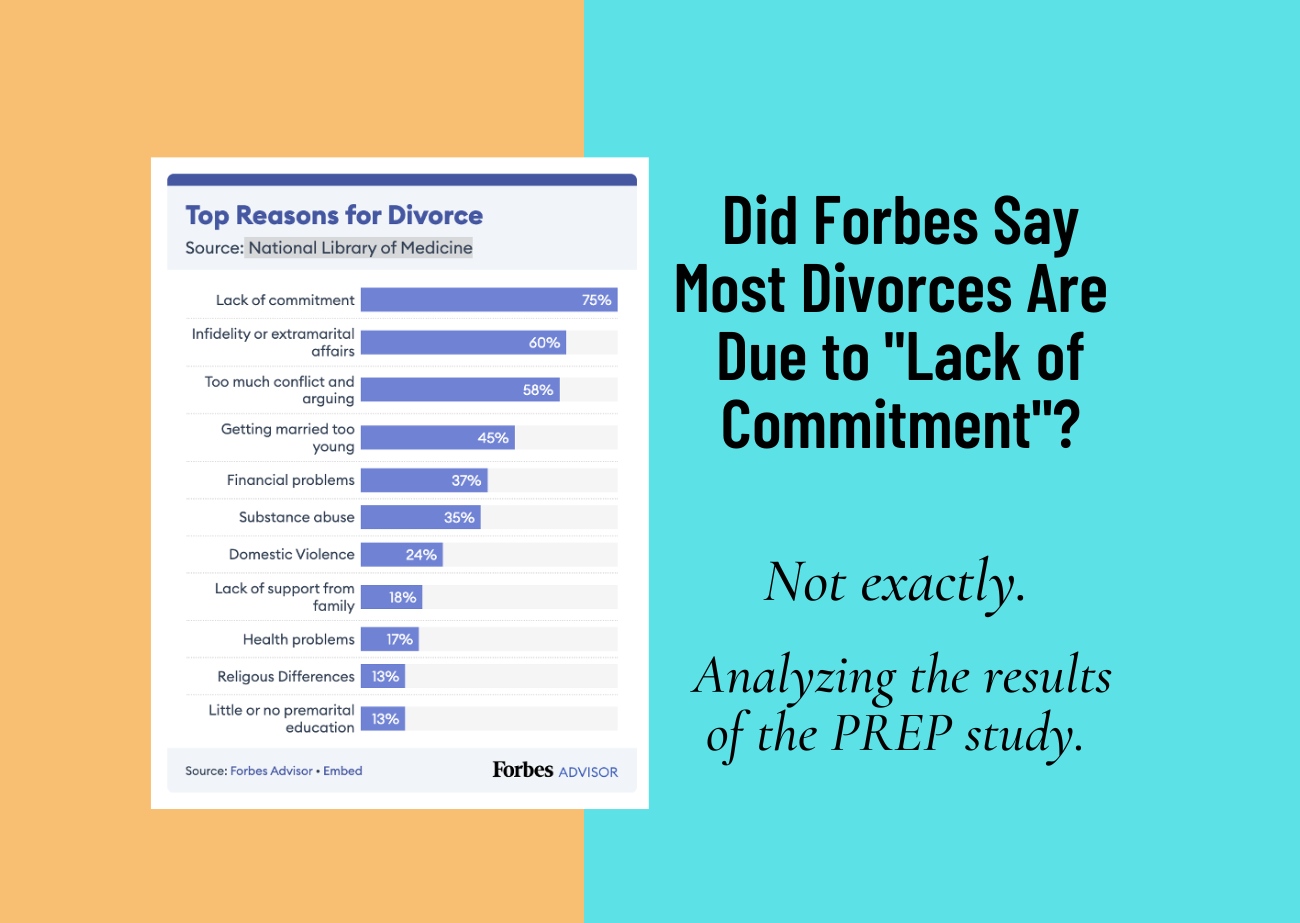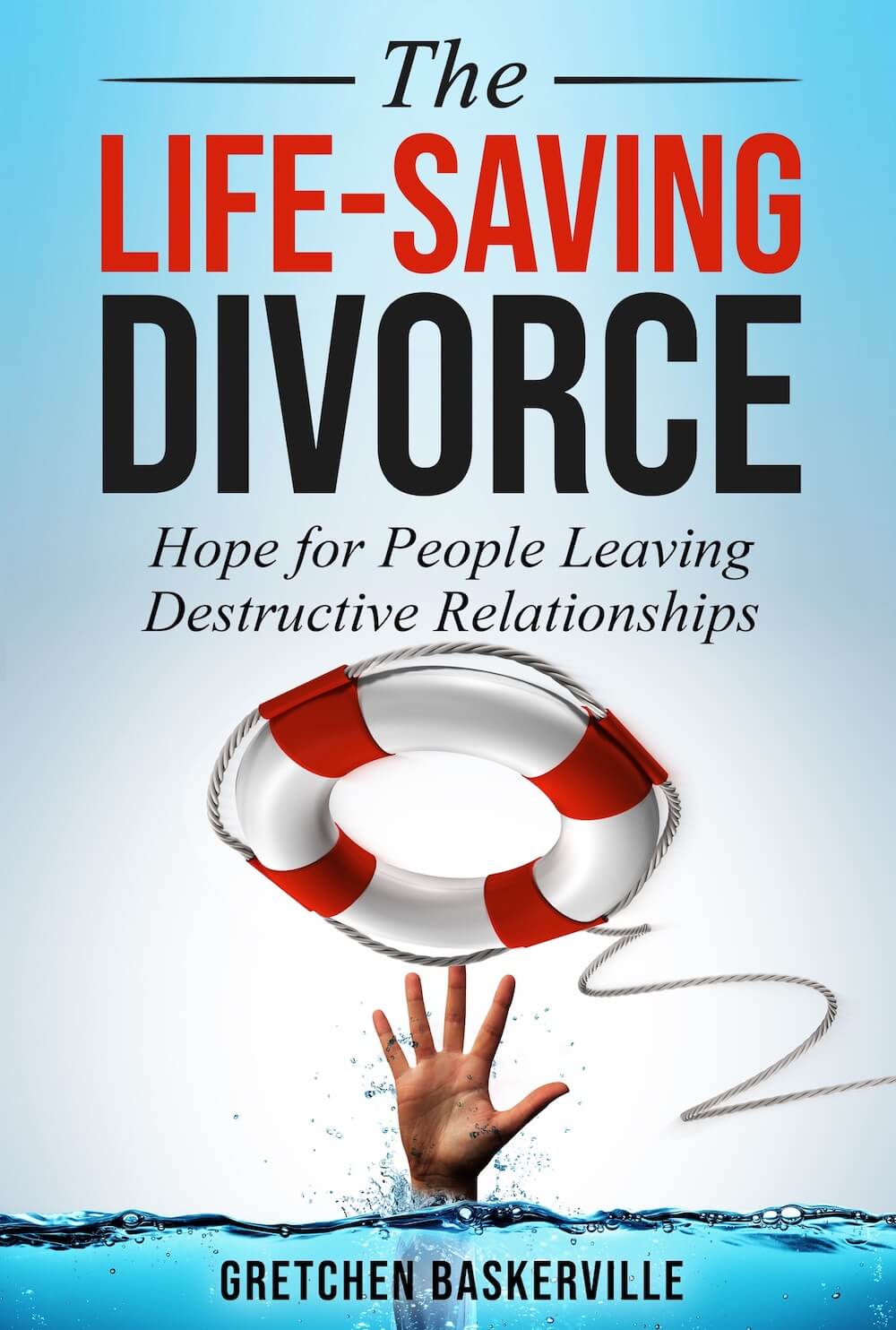Did Forbes Really Say “Lack Of Commitment” Is the Top Reason For Divorce?
Recently I saw the graph “Top Reasons for Divorce” on the Forbes Advisor website, and my heart sank.
The graph, which was based on the PREP study of 52 individuals and 36 couples, showed that 75% of marriages broke up due to “lack of commitment,” which was quite different from every other study I’ve read, where infidelity is almost always #1, followed by a number of other severe issues, usually with abuse and addictions in the top five.
This is the kind of headline that people use to stigmatize divorcees, and I’m just so tired of it.
I explain over and over that we conservative Christians (and other people of conservative faiths) tried harder to save our marriages than most normal people and that most of us divorced for serious reasons, for life-saving reasons, not because we just couldn’t go the distance like everyone else.
Fortunately, I found and read the actual study. It was a study of participants who underwent a 12-hour premarital program called PREP, before they were wedded. Many survey participants were likely serious about marriage, enough to give 12 hours to it. The researchers asked why they had thrown in the towel. It wasn’t apathy. They found it took something serious to bring them to divorce. For nearly 7 in 10 survey participants, a spouse’s infidelity, domestic violence, substance abuse or something generally similar was the “final straw” that ended it.
In other words, the “lack of commitment” was not because the person was “a quitter,” or “missed the party life,” or was “bored,” or wondered if “the grass is greener.” Their spouse was actively betraying the sanctity of their marriage.
Let’s look closely at the math in that study, “Top Reasons for Divorce,” on the Forbes Advisor website.
Here’s what they found as the reasons people gave for divorce. (Obviously, they add up to much more than 100%.)
-
- 75% said “lack of commitment”
- 60% said “affairs”
- 58% said “too much arguing”
- 35% said “substance abuse”
- 25% said “domestic violence” and 4 other answers.
When I looked at the actual study, I discovered that each of the 52 individuals and the 36 couples interviewed was allowed to give more than one reason for their divorce.
Well, the survey participants went for it! The 52 people chose 205 answers. It appears that, on average, EACH person chose nearly FOUR different reasons from the ELEVEN reasons for divorce. Link: https://www.ncbi.nlm.nih.gov/pmc/articles/PMC4012696/)
We can conclude that the majority of these individuals had been in destructive marriages. These weren’t just normal marriage ups and downs.
More than 2-in-3 survey participants said there was a final straw that led to the divorce. So, any idea that the majority were frivolous divorces is off base.
- Infidelity was mentioned by 24% (1 in 4) of the survey participants
- Domestic violence was mentioned by 21.2% (1 IN 5)
- Substance abuse was mentioned by 12.1% (1 in 9)
Link to the study: “Reasons for Divorce and Recollections of Premarital Intervention: Implications for Improving Relationship Education”: https://www.ncbi.nlm.nih.gov/pmc/articles/PMC4012696/)
The researchers found that:
“Participants expressed that although these “final straw” events may not have been the first incident of their kind (e.g., the first time they realized their partner had a substance abuse problem) an event involving these behaviors led to the final decision for their relationship to end. Also, there were some situations in which individuals expressed that these three issues may have interacted with one another or other relationship issues.”
According to the researchers who created the graph, they asked several questions. For example, in a separate question, they also asked a question about the “final straw” in the marriage.
Sure enough, the most common “final straw” reasons for divorce were:
-
- infidelity
- domestic violence, and
- substance abuse.
In chatting on Twitter with one of the researchers, I got the impression that the researchers appeared to explain it two ways: (1) either as a slow erosion of the relationship or as (2) progression from “lack of commitment” and to sudden marriage-shattering act, like infidelity, near the end that causes it all to come down.
For highly religious marriages, I would like to suggest a different explanation.
Call this option “explanation number three.” I see marriage-destroying behavior going on for many years, not just as a final event. Finally, the cost to the invested parent and children is just too high to go on. They were worried about the stigma of their church, but they couldn’t take it anymore. They were worried about what their pastor would think, and what their friends at church would think. But eventually, they said, “Enough is enough.” (By the way, the researchers did mention this as a valid pattern in their study, but I wanted to emphasize it.)
Most devout people of faith who needed a life-saving divorce tell me that they were committed to the marriage even though their spouse had a long pattern of tearing down the marriage through selfish behavior. The “final straw” wasn’t a one-off event. It was one incident in a long line of similar incidents.
It’s important that we don’t erase and ignore years of suffering prior to the divorce.
I always learn a lot from the people on Facebook. One person left a public comment:
“Lack of commitment would be an underlying contributing issue for any failed marriage.
Why do people cheat? Lack of commitment.
Why do people abuse? Lack of commitment.
Why do people lie? Lack of commitment.
Why do people overspend? Lack of commitment.
Why are people mean and selfish? Lack of commitment.
Why won’t people do the hard work of becoming better people? Lack of commitment.
That does not mean people are getting divorced for frivolous reasons. Rather, it means toxic people don’t really commit to living out the sacred marriage vows… because they are toxic people.”
On top of it, abusers say their victims “lack commitment” simply because they chose to divorce and find relief from the danger.
For many people, this imbalance of commitment existed for 20, 30, 40, or even 50 years in their marriage. THEY did not divorce due to their own “lack of commitment.” Every day they were investing time, money, and energy into making the marriage safe and loving. They were often risking their own lives and safety by staying. Their church required them to be committed and behave well. They finally divorced because their spouse’s destructive behavior was affecting their life and sanity and their children’s well-being. Their lives had become tense and chaotic.
I’ve been a divorce recovery leader for 25 years in conservative churches, and am the founder and administrator of the 5,000-member private online group, the “Life-Saving Divorce Private Group” on Facebook. So I hear from a lot more than 100 people every day.
People of faith, who follow church teachings, “stay and pray” and forgive over and over for years, despite their spouse’s cheating, addictions, and abuse. They attend churches that tell them to “fight for their marriage,” meaning “stay married at any cost to yourself and your children.”
To make matters worse, these highly invested spouses were shamed by church leaders, Christian authors, and Focus on the Family for not fixing their spouse’s destructive behavior, and were told that they could fix the marriage if they were just nice enough, forgiving enough, or positive enough.
In this study, 3 in 10 people said they wished they had been educated about “red flags” in their premarital classes, and had walked away rather than entering the marriage.
The people in my group will tell you they had far too much commitment to a low-commitment spouse who put little investment in the marriage. They may have endured physical or emotional abuse, callous manipulation, deception, psychological aggression or neglect, cheating, child abuse, and/or family-crushing additions. They stay for years. Why? Because the church required them to. They were told God hates divorce, and that meant that God would hate them for divorcing. (By the way, every NEW MAJOR Bible translation since the publication of the Dead Seas Scrolls in 1996, has used the more accurate Hebrew wording that condemns men for unjustly divorcing their wives. Not one of these new major translations say “God hates divorce” or “I hate divorce.” See the English Standard Version, the Christian Standard Bible, and the New International Version 2011 update.)
I’m not sure that selecting it off a list was a good way of teasing out the real reasons for divorce. It just doesn’t tell us much, and it exposes us to harm because there are malicious people who want ammunition to make divorce harder to get. They malign those who initiate divorce, even in cases of abuse, tarnishing them as having a “lack of commitment.”
Bottom line:
The interpretation that 75% of people divorce frivolously just because they had no commitment, simply isn’t true. That’s not the conclusion of the “Top Reasons for Divorce” study mentioned on the Forbes Advisor website.
In their conclusion, the researchers made a very important statement: Good premarital counseling should encourage good communication but also dissuade distressed or abusive couples from marrying. The researchers suggest the couple should take substance abuse and aggressive behavior seriously. They encourage the future spouse to say, “…change these behaviors or break up.” The researchers found, “One of the potential benefits of relationship education is that it can help some couples on an ill-advised or premature path toward marriage to reconsider their plans.”
This study was conducted to measure the success of the PREP premarital education program. (By the way, I like PREP as a premarital program. There’s a Christian and a secular version.)
Are you going through a life-saving divorce? I’d like to invite you to my private Facebook group, “Life-Saving Divorce for Separated or Divorced Christians.” Just click the link and ANSWER the 3 QUESTIONS. This is a group for women and men of faith who have walked this path, or are considering it. Supporters and people helpers are also welcome. I’ve written a book about spiritual abuse and divorce for Christians. Also, sign up for my email list below.
50 MOST POPULAR BLOG POSTS
Start Here
- What is a Life-Saving Divorce? How Do We Know Half of Divorces are “Life-Saving”? (or watch the video)
- Life-Saving Divorce: Introduction What Is this Book About? (audio and transcript)
- About Me: Why Is a Nice Christian Girl Like Me Promoting Divorce?
- How Can I Get the Book, The Life-Saving Divorce? (Amazon affiliate link.)
Physical and Emotional Abuse & Infidelity
- 130 Examples of Abuse: Emotional, Physical, Financial, Spiritual and Gaslighting
- Abuse is Biblical Grounds for Divorce
- “But He Never Hit Me”: Divorce for Neglect, Emotional, and Financial Abuseå
- Pastors Who Accept Physical and Emotional Abuse as Grounds for Divorce
- Severe Emotional Neglect: Toni’s Story of Finding Freedom (video)
- 40 Years of Murderous Rages and How I Got Free! Karen’s story (video)
- How Churches Should Handle Abuse Victims (video with Pastor Neil Schori)
- Help! I’m Married to a Cheater: Should I Stay or Go?
- Married to a Pedophile: How I Got Out – Pam’s Story (video)
- Help! I Am Alone with the Abuser
God Allows Divorce to Protect Victims
- Jesus’ Greatest Divorce Sermon – Luke 13 (or watch the Video)
- Pastors Who Accept Physical and Emotional Abuse as Grounds for Divorce
- Myth: The Person Who Files for Divorce Caused the Divorce
- Haven’t Our English Bibles Always Said, “God hates divorce”? No.
- Jesus Said, “Love My Enemy”-Can I Still Divorce Them?
- But I Thought it Was God’s Will for Me to Marry this Person!
- Is Pointing Out Marriage-Endangering Sin Being Judgmental? (video)
- One Woman’s Story: Adultery, Prayer and the Bible
- Is Marriage an Unconditional Covenant or a Conditional One? (Video)
- Does Divorce Shatter the Image of Christ and the Church as John Piper Suggests?
- Divorce and the Good Samaritan Story
- Myth: Divorce is the Unpardonable Sin and “God Hates Divorce”
- Myth: Your Divorce Will Shatter the Image of Christ and the Church
- Myth: You Must Forgive and Forget Over and Over, Forever
Does God Hate Divorce? No, Most English Bible Translations Don’t Say That
- Malachi 2:16 Haven’t Our English Bibles Always Said, “God hates divorce”? No.
- Myth: Divorce is the Unpardonable Sin and “God Hates Divorce”
- List of Every Known Puritan Divorce in Massachusetts between 1639 and 1692.
How to Find a Good Supportive Church
- Pastors Who Accept Physical and Emotional Abuse as Grounds for Divorce
- 7 Ways to Know if a Church is Safe for Abused Wives (or Abused Husbands)
- Do My Pastors Have a Say about Me Getting a Divorce?
- Good vs. Bad Pastoral Counselors on the Topic of Marital Abuse: 40 People Tell their Stories
What If My Pastor Says It Would Be Wrong to Get Divorced for Abuse?
- 5 Bible Verses that Say You Should Separate from an Abuser
- 1 Million God-honoring Divorcees Cannot Find a Good Church
- Church Denominations and Divorce Policies Comparison Chart
- Excommunication for Getting Divorced? What to Do!
- Evangelicals Shooting their Own Wounded Divorcees (video) or blog/transcript
- How to Handle Criticism When You Divorce (video-3 parts) Natalie Hoffman, Gina Kaye
- Myth: You Don’t Take God-Ordained Marriage Seriously
- Sermon Ideas for Domestic Violence Awareness Month – October
- Churches That Block Abused Wives (and Husbands) From Divorcing
- Southern Baptists make Evangelicalism Unsafe for Abused Wives & Husbands
- How Churches Should Handle Abuse Victims (video with Pastor Neil Schori)
Divorce Saves Lives: The Surprising (Wonderful!) Truth About Divorce Nobody Told You
- Your Kids Will Likely Be Fine After Divorce (Nearly 8 in 10 Are!)
- 10 Facts Evangelical Pastors MUST Know about Kids and Divorce [VIDEO]
- There Is No Divorce Crisis. We have a Sin Crisis.
- Myth: 95% of Divorces are for Falling Out of Love
Will I Ever Find Love Again? Dating After Divorce: Good News
- Will I Ever Find Love Again?
- Dating after Divorce: An interview with Gina Kaye
- I Fear I’ll Never Find a Healthy Relationship
- Remarriage after Divorce: How Can I Claim to be the Innocent Spouse? I Had My Faults Too!
Finding Happiness and Health After Divorce
- Will the Kids and I Ever Be Happy Again?
- Happiness Either Way: Remarriage or Staying Single
- Divorce May Improve Your Health: Depression, Suicidal Thoughts and Medical Issues
- How My Health Improved Dramatically After Divorce: Karen’s Story (video)
- “I’m Off of All My Depression Medications Now That I’ve Divorced” Schari’s story (video)
- PTSD, EMDR and My Major Health Improvements after Divorce Toni’s story (video)
Thriving After Divorce: These Christians Tell their Stories
- Christians Finding Peace after Divorce: Shirley Fessel, Author (Audio) or (Video)
- 10 Turning Points: Stories of How Others Decided to Stay or to Go
- Married to a Pedophile: How My Kids and I Got Free! (video)
- Finding Joy after a 40-Year Abusive Marriage (video)
- Can I Divorce My Mentally Ill, Destructive Spouse? Yes! Amanda’s Story (video)
- From Bondage to Glorifying God! 5 Survivor Stories (after 20-, 30-, 40-year long abusive marriages)
Self-Doubt, Second-Guessing Ourselves, and Gaslighting
- Am I the One Destroying the Relationship?
- How Can I Call Myself the Innocent Spouse? I Wasn’t Perfect Either (video)
- Is Pointing Out Marriage-Endangering Sin Being Judgmental? (video)
- Myth: He Wouldn’t Cheat or Watch Porn if You Gave Him More Sex
- Myth: You’re Lying: We’d All Know If Your Spouse Was That Bad
- Myth: It Takes “Two to Tango” and “All Marriage Problems are 50/50”
- How to Handle Criticism When You Divorce (video-3 parts) Natalie Hoffman, Gina Kaye
Children and Divorce: Researchers Give Hope
- Is it Best to “Stay for the Kids”? Sometimes, yes. But Not if It’s a Toxic Marriage
- Researchers Know Your Kids Will Likely Be Fine After Life-Saving Divorce
- 5 Studies That Say Your Kids are Likely to Be Okay After Divorce (video)
- Marriage Does Not Guarantee Good Kids: 1 in 10 Kids from Married Two-Parent Homes are Troubled.
- Myth 21: Divorce will Destroy Your Children, So Stay for the Sake of Your Kids
High Conflict Divorce and Parenting
- Research shows: Your Kids Will Likely Be Fine After Divorce: In Fact It’s Best to Divorce to Get Away From Abuse
- 12 Ways to Document and Protect Yourself in a High-Conflict Divorce
- 12 Tips for Talking with Angry, Alienated Kids
- Myth: Divorce will Destroy Your Children, So Stay for the Sake of Your Kids
Recommended Reading List and Free Resources for Christians and Other People of Faith
Common Myths
- Myth: Your Marriage Would Be Great if You Just Submitted More
- Myth: Divorce will Destroy Your Children, So Stay for the Sake of Your Kids
- Myth: Divorce is the Unpardonable Sin and “God Hates Divorce”
- Myth: You Just Didn’t Try Hard Enough
- Myth: You Don’t Take God-Ordained Marriage Seriously
- Myth: Your Divorce Will Shatter the Image of Christ and the Church
- Myth: You Must Forgive and Forget Over and Over, Forever
- Myth: 95% of Divorces are for Falling Out of Love
- 27 Myths about Divorce That Probably Don’t Apply to Committed Christians
FREE
- Download “7 Effective Ways to End the Stigma of Divorce in the Church” (Sign up)
- Download “7 Effective Ways to Deal with Criticism when You Divorce” (Sign up)
- Download “3 Studies that Show Kids Are Most Likely to Turn Out Fine After Divorce” (Sign up at bottom of page)
FOLLOW
- Home Follow me on Facebook • Follow me on Twitter • Buy the book.
- 10 Key Highlights from the The Life-Saving Divorcebook: 10-minute video overview OR 10 Key highlights blog post
- Request to Join the Life-Saving Divorce Private Facebook Group (Don’t forget to answer the 3 questions)
- Subscribe (FREE) to my You Tube Channel
- About Me Contact
- Gretchen’s Life-Saving Divorce Interviews in the Media
GET THE BOOK! The Life-Saving Divorce is about divorces for very serious reasons: a pattern of sexual immorality, physical abuse, chronic emotional abuse, life-altering addictions, abandonment, or severe neglect. This book will give you hope for your future, and optimism about your children. As an Amazon Associate I earn from qualifying purchases.



 :
:
 Buy PDF
Buy PDF